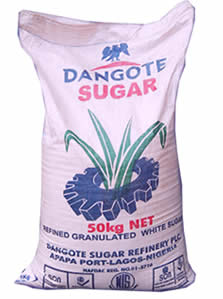Dangote Sugar Refinery, on Thursday presented its audited result for the year ended December 31, 2017, showing an impressive growth in revenue from sales and even more robust increase in profit arising from a constrained rise in cost of sales, just as investment income soared by 459.33%.
Arising therefrom, the board has offered a final dividend of N1.25 per share, from the Earnings Per Share of N3.21 for consideration by shareholders at the annual general meeting slated for June 21, 2018. Ahead of that, closure of register is between April 16 to 20, while qualification date is April 13; payment is scheduled for June 22, 2018.
Details of performance score-card of Dangote Sugar for the period under review shows that turnover increased by N34.698bn or 20.44% from N169.724bn to N204.422bn, with sale 50kg bags generated the lion’s share of N196.753bn, up from N162.918bn. Revenue from retail packs contributed N4.673bn, as against the previous N3.807bn; while sale of molasses fetched N694.215m, as against the prior year’s N198.243m; with freight income yielding the remaining N3.301bn, up from N2.8bn.
By region, Lagos remained the Dangote Sugar’s biggest market, contributing N96.14bn, up from N82.36bn; followed by northern with N72.507bn from N61.366; while western Nigeria fetched N24.847bn, as against the previous N19.581bn; and eastern Nigeria, N10.927bn, up from N7.395bn.
As required, Dangote Sugar reported its exposure to Nigerian Bottling Company Limited, being the single largest customer and accounting for more than 10% of sale revenue. The company bought industrial non-fortified sugar worth N28.19bn in the period under review, which brought total sales to leading blue-chip Nigerian companies, including manufacturers of confectioneries and soft drinks to 30%.
Cost of sales limped by just N6.698bn or 4.56% to N153.434bn, compared with the previous N146.736bn; with Lagos accounting for N72.881bn, as against the previous N72.207bnl; followed by Northern Nigeria’s N50.356bn, down slightly from N51.758bn; West recorded N20.834bn, up from N16.287bn; while the east accounted for N9.361bn from the previous N6.382bn.
A breakdown of the cost of sales showed that raw material dropped to N123.858bn from N126.495bn; followed by the N16.598bn spent on direct overheads, up from N9.778bn; among others.
Gross profit increased to N50.988bn, N28bn or 121.8% better than the N22.988bn recorded in the corresponding period of 2016; helped mainly by Lagos with N23.259bn, up from N10.172bn; and North, N22.15bn, as against N9.607bn in 2016.
Other income however dropped by N305.955m or 43.23% from N707.641m to N401.686m; just as selling and distribution expenses closed flat at N1.132bn from N1.272bn, with selling and marketing expenses gulping N1.019bn from N909.196m. Administrative expenses increased to N6.35bn from N5.572bn, the biggest of which was the N2.057bn employee costs, which rose from N1.987bn; resulting in operating profit of N43.907bn, up by N27.056bn or 160.56%, when compared with the N16.851bn of 2016.
Investment income, which was principally interest income on bank deposits jumped by N2.762bn to N3.364bn from just N601.473m; fair value adjustment for Dangote Sugar for the period also dropped slightly to N2.468bn from N2.504bn; even as the year ended with a net finance income of N3.858bn, compared with an expense of N343.19m in 2016.
All considered, profit before tax soared N33.984bn or 173.26% up from N19.614bn to N53.598bn; while tax rose to N13.815bn, representing a growth of N8.597bn or 164.75% from N5.218bn. Net profit for the period grew by N25.388bn or 176.36% from N14.395bn to N39.783bn.
Trending Today
Menu







